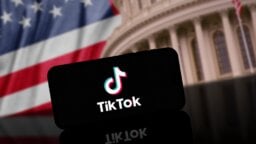TikTok has refuted claims that it is forcing out Erich Andersen, the company’s US general counsel tasked with addressing national security concerns regarding its Chinese ties.
This comes as the Protecting Americans from Foreign Adversary Controlled Applications Act, better known as the divest-or-ban legislation targeting TikTok, gains traction in the US.
Bloomberg News reported Saturday (April 20) that TikTok planned to remove Andersen from his role leading negotiations with the US government. These talks aimed to demonstrate that the app safeguards American user data and content recommendations from Chinese influence.
However, these efforts reportedly failed to assuage the concerns of a US government panel conducting a security review and legislators proposing a forced divestiture.
The House of Representatives recently passed a bill mandating TikTok’s sale from its Chinese parent company, ByteDance, or face a ban in US app stores. Bloomberg said Andersen was expected to exit his current position, but the company denied this.
“That is 100% false,” said TikTok spokesperson Alex Haurek when questioned by Bloomberg about Andersen’s potential removal.
Andersen remains with TikTok for the time being, the news outlet said, citing one of its sources.
However, a report in The Information suggests otherwise. It claims Andersen sent an internal email expressing his plan to step down as general counsel. He emphasized that the decision came of his own initiative and that discussions regarding his departure began “months ago.”
Andersen assured colleagues that he will remain at the company until “we can be assured that there will be no drop off in focus and attention,” after which he will serve in an advisory capacity.
Andersen joined TikTok in 2020, transitioning from Microsoft Corp. where he held the position of corporate vice president and chief IP counsel.
This news emerges as the divest-or-ban legislation approaches legal enforcement. The Senate is poised to pass the bill next week, with President Joe Biden confirming his intention to sign it, potentially forcing TikTok’s sale within a year.
If passed into law, ByteDance would be given 165 days to sell its holdings in TikTok; otherwise it would be banned from app stores in the US.
Angelo Zino, a vice president and senior equity analyst at CFRA Research, told CNBC last month that based on market comparisons, TikTok’s US operations “could fetch a valuation north of $60 billion” when “looking at peer valuations in the market.”
“That said, we don’t even know if it would get to that point as ByteDance could decide to just have TikTok stop doing business in the US if forced to do so,” Zino said.
Music Business Worldwide





